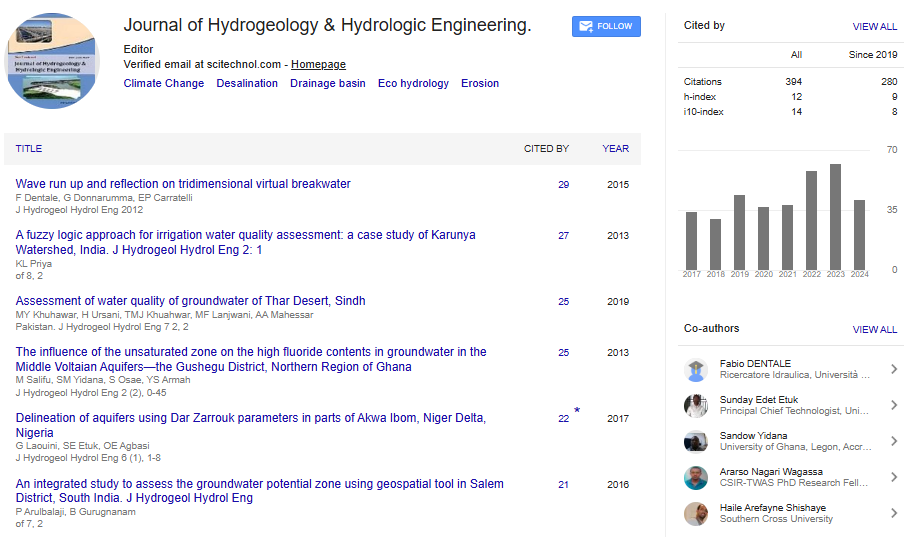Perspective, J Hydrogeol Hydrol Eng Vol: 12 Issue: 1
Climate Change: The Environmental Challenge of Our Time
Christine Gilbert*
Department of Environmental Sciences, University of Graz, Graz, Austria
*Corresponding Author: Damte Enoch
Department of Environmental Sciences, University of Graz, Graz, Austria
E-mail: gilbertc56@gmail.com
Received date: 24 January, 2023, Manuscript No. JHHE-23-90695;
Editor assigned date: 26 January, 2023, PreQC No. JHHE-23-90695 (PQ);
Reviewed date: 09 February, 2023, QC No. JHHE-23-90695;
Revised date: 16 February, 2023, Manuscript No. JHHE-23-90695 (R);
Published date: 24 February, 2023, DOI: 10. 4172/2325-9647.1000248
Citation: Gilbert C (2023) Climate Change: The Environmental Challenge of Our Time. J Hydrogeol Hydrol Eng. 12:1.
Description
Climate change is one of the most pervasive environmental issues facing our planet today. The Earth's climate is changing rapidly, and the consequences of this change are becoming increasingly evident. From rising sea levels and more frequent and intense heat waves, to droughts, wildfires, and other extreme weather events, the impacts of climate change are already being felt around the world.
Climate change is primarily caused by human activities, particularly the burning of fossil fuels such as coal, oil, and gas. When we burn these fuels, carbon dioxide and other greenhouse gases are released into the atmosphere, trapping heat and causing the Earth's temperature to rise. This process is known as the greenhouse effect, and it is the main driver of climate change.
The consequences of climate change are far-reaching and potentially catastrophic. Rising temperatures and sea levels are already causing significant damage to ecosystems and infrastructure, threatening the survival of many plant and animal species and exacerbating poverty and inequality around the world. The World Health Organization (WHO) estimates that climate change is responsible for 150,000 deaths each year, and that this number could rise to 250,000 by 2030.
To address this urgent challenge, it is essential that we take action at both the individual and global levels. Here are some steps that individuals and communities can take to help combat climate change:
Reduce carbon footprint
The most effective way to combat climate change is to reduce our greenhouse gas emissions. We can do this by driving less, using energy-efficient appliances, reducing meat consumption, and supporting renewable energy sources such as solar and wind power.
Support climate-friendly policies
Governments and policymakers have a critical role to play in addressing climate change. We can support policies that promote clean energy, protect ecosystems, and reduce greenhouse gas emissions, such as carbon pricing and renewable energy mandates.
Advocate for change
We can also raise awareness about the urgency of the climate crisis and advocate for action at the local, national, and global levels. This can include participating in climate marches and protests, contacting are elected officials, and supporting organizations that are working to address climate change.
Climate Change
At the global level, there are several key initiatives underway to address climate change. One of the most significant of these is the Paris Agreement, an international treaty signed in 2015 by nearly every country in the world. The Paris agreement aims to limit global warming to well below 2 degrees Celsius above pre-industrial levels, with a target of 1.5 degrees Celsius. To achieve this goal, countries have committed to reducing their greenhouse gas emissions and increasing their use of renewable energy sources.
In addition to the Paris agreement, there are numerous other international initiatives and organizations working to address climate change. These include the United Nations framework convention on Climate Change, the intergovernmental panel on climate change, and the global climate action summit, among others.
Despite these efforts, however, the challenge of climate change remains immense. The world must take urgent and bold action to reduce greenhouse gas emissions, protect vulnerable communities and ecosystems, and prepare for the impacts of climate change that are already unavoidable.
Climate change is not just an environmental issue it is a social, economic, and political issue as well. As we work to address this challenge, it is essential that we consider the needs and perspectives of all communities and strive to create a more just and sustainable world for everyone.
Conclusion
Climate change is one of the most urgent and complex challenges facing our planet today. To address this challenge, we must take action at both the individual and global levels, reducing our greenhouse gas emissions, supporting climate-friendly policies, and advocating for change. We must also work together across borders, cultures, and sectors to create a more just and sustainable world for future generations.
 Spanish
Spanish  Chinese
Chinese  Russian
Russian  German
German  French
French  Japanese
Japanese  Portuguese
Portuguese  Hindi
Hindi 
